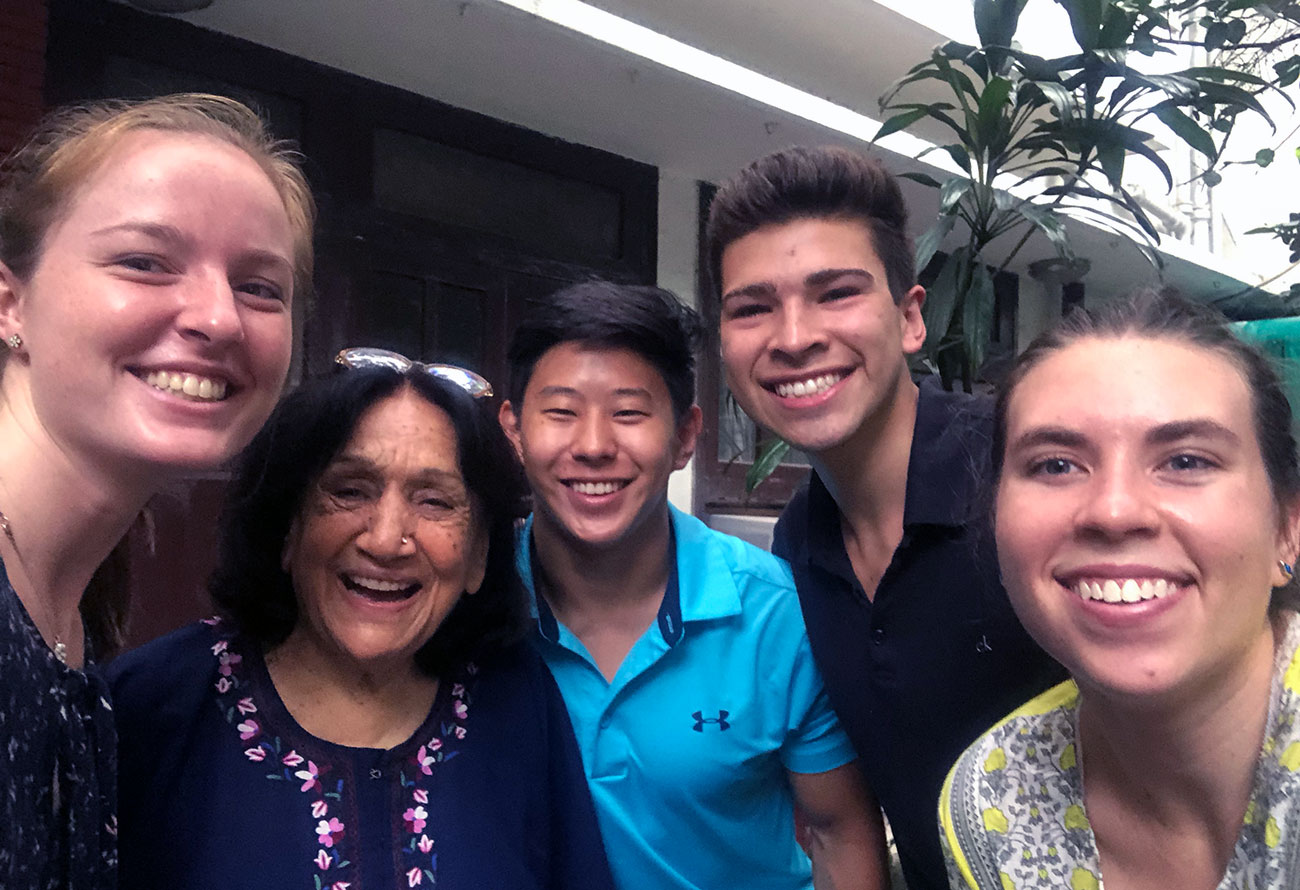ACE in India 2018
“You are home. Relax. You are my children now.” – Nani Ji, ACE in India ‘18 homestay host
Those were the welcoming words Nani Ji offered to Kate Kutzer (Duke Women’s Track & Field), Nicki Schindler (Stanford Women’s Rowing), Nathaniel Hernandez (Duke Men’s Swimming & Diving), and Blake Sun (Stanford Men’s Gymnastics) when they arrived to spend a weekend in her home as part of the Rubenstein-Bing Student-Athlete Civic Engagement Program (ACE) in India. Kutzer says this immersive experience helped make New Delhi feel “like a home away from home.”

This summer, ten student-athletes from Duke and Stanford lived and served in New Delhi, India for three weeks, leading sports instruction for students at DAV K-12 Public School while also working in small groups at one of four local health organizations. In a change from previous years, this year’s ACE in India program focused on health education and outreach in addition to sports enrichment and coaching. Students also had the opportunity for the first time to stay with a host family for three nights during the program.
Student-athletes worked together at DAV one day a week and in small groups of 2-3 at Butterflies (an NGO that provides education and life skills to vulnerable children), Drug Treatment Centre and Society for Promotion of Youth and Masses or SPYM (a rehab center for adolescent males), Action for Autism (an NGO that advocates for individuals with autism) or Goal at the NAZ foundation (an NGO based program that empowers adolescent girls through health education and sports) three days a week. Whether it was participating in drug rehabilitation sessions, teaching English, planning play time for children on the autism spectrum, or preparing nutrition charts, the student-athletes had the opportunity to be engaged in a wide variety of health initiatives.

Even though the student-athletes only worked at DAV one day a week, group bonding activities, such as singing and dancing along to a classic Hindu mantra in music class and watching students present sophisticated research projects, allowed the student-athletes to form bonds with the DAV students quickly. Julia Persche, Stanford Women’s Lacrosse, shared how DAV’s learning environment helped her and the other student-athletes build relationships with the DAV students, writing “with just the three phrases I knew and [the students’] limited English, there was still more than enough common ground for the kids and ACE coaches to share a laugh over our painfully off-beat melody in music class or a communal cheer over an impressive volleyball rally in gym.” Maddie Hess, Duke Women’s Swimming & Diving, explained that play time during the sports camp also helped the student-athletes overcome the language barrier, realizing “I never knew just how powerful sports could truly be. It was special to see sports transcend language and culture.”
“I never knew just how powerful sports could truly be. It was special to see sports transcend language and culture.” – Maddie Hess, Duke Women’s Swimming & Diving
Nikki Schindler, Stanford Women’s Rowing, explained that the power of an active lifestyle also helped her and Kylie Jordan, Duke Women’s Swimming & Diving, connect with the female health coaches at the NAZ Goal Program, an NGO program which aims to empower girls through sports and life skills education. While presenting nutrition charts that she and Jordan created together, she learned the importance of open conversation, writing “It was such an awesome experience to talk female-athlete-to-female-athlete about a topic that is so important, not only to our performance as collegiate athletes, but fundamentally crucial to maintaining a healthy lifestyle.”
“Ignorance is what fixates your frame of mind…. I learned that if you want to truly understand and empathize with someone else’s perspective, you have to read, research, and most importantly talk to people and ask questions.” – Julia Persche, Stanford Women’s Lacrosse

Nathaniel Hernandez, Duke Men’s Swimming & Diving, writes that he also learned how intentional conversation can shift someone’s perspective while working at SPYM, a 90-day drug detox program for adolescent boys. In a blog post, Hernandez explained that his time at SPYM transformed his own outlook on drug addiction. He wrote, “After spending three weeks with the children of SPYM, my perception of drug users has been changed greatly. These truly were just children!” Persche, who worked at a life skills child education development center called Butterflies, echoed Hernandez’ reflection in her own final reflection blog post. She wrote, “Ignorance is what fixates your frame of mind…. I learned that if you want to truly understand and empathize with someone else’s perspective, you have to read, research, and most importantly talk to people and ask questions.”
Whether these conversations were held during a nutrition class, a drug rehabilitation session, or tea with Nani Ji, they were more than just words for the ACE student-athletes of 2018. They were vehicles of transformation.
